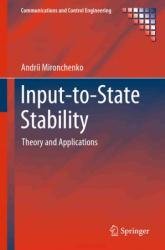- Добавил: polyanskiy
- Дата: 19-04-2023, 13:00
- Комментариев: 0

Автор: Д. Сакрисон
Название: Лекции об аналоговой связи
Издательство: М:, Мир
Год: 1974
Страниц: 168
Формат: DJVU, PDF
Размер: 10 МБ
Книга посвящена вопросам теории передачи непрерывных сообщений и связанным с ними проблемам оценивания неизвестного параметра непрерывного случайного процесса. Особый интерес представляет обсуждение вопроса о границах снизу дисперсии оценки неизвестного параметра, основанной на наблюдении течения процесса...


 Название: Стандартизация, метрология, сертификация
Название: Стандартизация, метрология, сертификация Название: Input-to-State Stability: Theory and Applications
Название: Input-to-State Stability: Theory and Applications


 Название: Biomimetic Nanotechnology: Senses and Movement, 2nd Edition
Название: Biomimetic Nanotechnology: Senses and Movement, 2nd Edition
